Connector the Scan tool to the 16P data link connector located the driver's side kick panel.
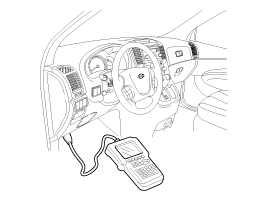
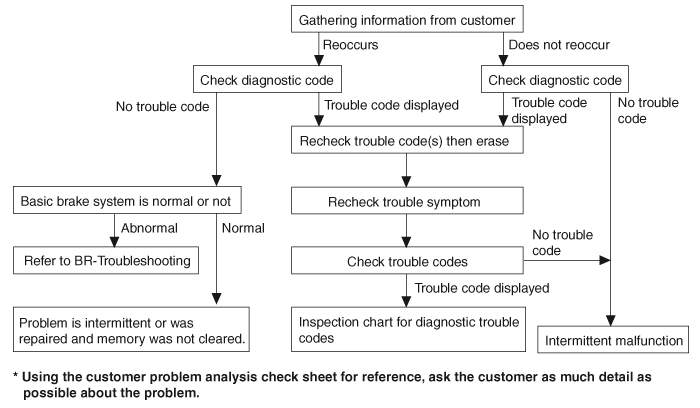
The phenomena listed in the following table are not abnormal.
Phenomenon | Explanation |
System check sound | When starting the engine, a thudding sound can sometimes be heard coming from inside the engine compartment. This is because the system operation check is being performed. |
ABS operation sound | 1. Sound of the motor inside the ABS hydraulic unit operation (whine). 2. Sound is generated along with vibration of the brake pedal (scraping). 3. When ABS operates, sound is generated from the vehicle chassis due to repeated brake application and release (Thump : suspension; squeak: tires) |
ABS operation (Long braking distance) | For road surfaces such as snow-covered and gravel roads, the braking distance for vehicles with ABS can sometimes be longer than that for other vehicles. Accordingly, advise the customer to drive safely on such roads by lowering the vehicle speed. |
Diagnosis detection conditions can vary depending on the diagnosis code. When checking the trouble symptom after the diagnosis code has been erased, ensure that the requirements listed in "Comment" are met. | |
Turn the ignition switch OFF.
Connector the Scan tool to the 16P data link connector located the driver's side kick panel.

Turn the ignition switch ON.
Check for DTC using the Scan tool
After completion trouble of the repair or correction of the problem, erase the stored fault codes using the scan tool.
Disconnect the Scan tool from the 16P data link connector.
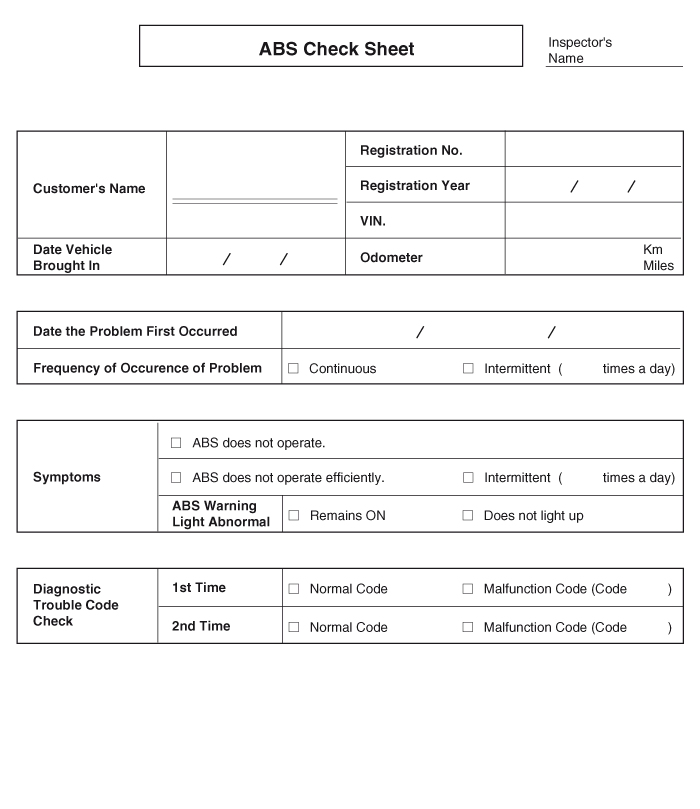
Symptom | Suspect Area |
ABS does not operate. | Only when 1. -4. are all normal and the problem is still occurring, replace the HECU. 1. Check the DTC reconfirming that the normal code is output. 2. Power source circuit. 3. Speed sensor circuit. 4. Check the hydraulic circuit for leakage. |
ABS does not operate intermittently. | Only when 1. -4. are all normal and the problem is still occurring, replace the ABS actuator assembly. 1. Check the DTC reconfirming that the system is operating to specifications. 2. Wheel speed sensor circuit. 3. Stop lamp switch circuit. 4. Check the hydraulic circuit for leakage. |
Communication with Scan tool is not possible. (Communication with any system is not possible) | 1. Power source circuit 2. Diagnosis line |
Communication with Scan tool is not possible. (Communication with ABS only is not possible) | 1. Power source circuit 2. Diagnosis line 3. HECU |
When ignition key is turned ON (engine OFF), the ABS warning lamp does not light up. | 1. ABS warning lamp circuit 2. HECU |
Even after the engine is started, the ABS warning lamp remains ON. | 1. ABS warning lamp circuit 2. HECU |
During ABS operation, the brake pedal may vibrate or may not be able to be depressed. Such phenomena are due to intermittent changes in hydraulic pressure inside the brake line to prevent the wheels from locking and is not an abnormality.

Trouble Symptoms | Possible Cause |
Brake operation varies depending on driving conditions and road surface conditions, so diagnosis can be difficult.However if a normal DTC is displayed, check the following probable cause. When the problem is still occurring, replace the ABS control module. | - Inoperative power source circuit - Inoperative wheel speed sensor circuit - Inoperative hydraulic circuit for leakage - Inoperative HECU |
DTC INSPECTION
Connect the Scan Tool with the data link connector and turn the ignition switch ON.
Verify that the system is operating to specifications.
Is the system operating to specifications?

▶ Check the power source circuit.

▶ Erase the DTC and recheck using Scan Tool.
Disconnect the connector from the ABS control module.
Turn the ignition switch ON, measure the voltage between terminal 18 of the ABS control module harness side connector and body ground.
Specification: approximately B+
Is the voltage within specification?

▶ Check the ground circuit.

▶ Check the harness or connector between the fuse (10A) in the engine compartment junction block and the ABS control module. Repair if necessary.
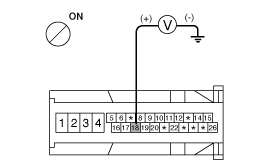
Disconnect the connector from the ABS control module.
Check for continuity between terminals 1,4 of the ABS control module harness side connector and ground point.
Is there continuity?

▶ Check the wheel speed sensor circuit.

▶ Repair an open in the wire and ground point.
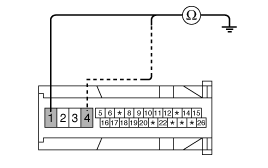
Refer to the DTC troubleshooting procedures.
Is the system operating to specifications?

▶ Check the hydraulic circuit for leakage.

▶ Repair or replace the wheel speed sensor.
Refer to the hydraulic lines.
Inspect leakage of the hydraulic lines.
Is the system operating to specifications?

▶ The problem is still occurring, replace the ABS control module.

▶ Replace the leaking hydraulic lines.

Trouble Symptoms | Possible Cause |
Brake operation varies depending on driving conditions and road surface conditions, so diagnosis can be difficult.However if a normal DTC is displayed, check the following probable cause. When the problem is still occurring, replace the ABS control module. | - Inoperative power source circuit - Inoperative wheel speed sensor circuit - Inoperative hydraulic circuit for leakage - Inoperative HECU |
DTC INSPECTION
Connect the Scan Tool with the data link connector and turn the ignition switch ON.
Verify that the system is operating to specifications.
Is the system operating to specifications?

▶ Check the wheel speed sensor circuit.

▶ Erase the DTC and recheck using Scan Tool.
Refer to the DTC troubleshooting procedures.
Is the system operating to specifications?

▶ Check the stop lamp switch circuit.

▶ Repair or replace the wheel speed sensor.
Check that stop lamp lights up when brake pedal is depressed and turns off when brake pedal is released.
Measure the voltage between terminal 20 of the ABS control module harness side connector and body ground when brake pedal is depressed.
Specification: approximately B+
Is the voltage within specification?

▶ Check the hydraulic circuit for leakage.

▶ Repair the stop lamp switch. Repair an open in the wire between the ABS control module and the stop lamp switch.
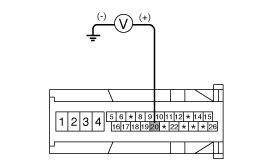
Refer to the hydraulic lines.
Inspect leakage of the hydraulic lines.
Is the system operating to specifications?

▶ The problem is still occurring, replace the ABS control module.

▶ Replace the leaking hydraulic lines.

Trouble Symptoms | Possible Cause |
Possible malfunction in the power supply system (including ground) for the diagnosis line. | - An open in the wire - Poor ground - Inoperative power source circuit |
CHECK THE POWER SUPPLY CIRCUIT FOR THE DIAGNOSIS
Measure the voltage between terminal 9 of the data link connector and body ground.
Specification: approximately B+
Is voltage within specification?

▶ Check the ground circuit for the diagnosis.

▶ Repair an open in the wire. Check and replace fuse (15A) from the engine compartment junction block.
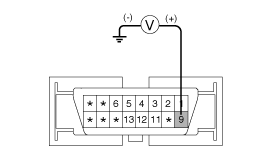
Check for continuity between terminal 5 of the data link connector and body ground.
Is there continuity?

▶ Repair an open in the wire between terminal 5 of the data link connector and ground point.
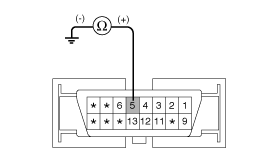

Trouble Symptoms | Possible Cause |
When communication with Scan Tool is not possible, the cause may be probably an open in the HECU power circuit or an open in the diagnosis output circuit. | - An open in the wire - Inoperative HECU - Inoperative power source circuit |
CHECK FOR CONTINUITY IN THE DIAGNOSIS LINE
Disconnect the connector from the ABS control module.
Check for continuity between terminals 11 of the ABS control module connector and 1 of the data link connector.
Is there continuity?

▶ Check the power source of ABS control module.

▶ Repair an open in the wire.
Disconnect the connector from the ABS control module.
Turn the ignition switch ON, measure the voltage between terminal 18 of the ABS control module harness side connector and body ground.
Specification: approximately B+
Is voltage within specification?

▶ Check for poor ground.

▶ Check the harness or connector between the fuse (10A) in the engine compartment junction block and the ABS control module.Repair if necessary.

Check for continuity between terminal 5 of the data link connector and ground point.

▶ Replace the ABS control module and recheck.

▶ Repair an open in the wire or poor ground.


Trouble Symptoms | Possible Cause |
When current flows in the HECU the ABS warning lamp turns from ON to OFF as the initial check.Therefore if the lamp does not light up, the cause may be an open in the lamp power supply circuit, a blown bulb, an open in the both circuits between the ABS warning lamp and the HECU, and the inoperative HECU. | - Inoperative ABS warning lamp bulb - Blown No.2 fuse (10A) in the engine compartment junction block - Inoperative ABS warning lamp module - Inoperative HECU |
PROBLEM VERIFICATION
Disconnect the connector from the ABS control module and turn the ignition switch ON.
Does the ABS warning lamp light up?

▶ It is normal. Recheck the ABS control module.

▶ Check the power source for the ABS warning lamp.
Disconnect the instrument cluster connector and turn the ignition switch ON.
Measure the voltage between terminal 8 of the cluster harness side connector and body ground.
Specification: approximately B+
Is voltage within specification?

▶ Repair bulb or instrument cluster assembly.

▶ Check for blown fuse.
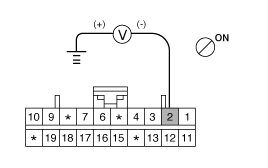
Check continuity of fuse (10A) from the engine compartment junction block.
Is there continuity?

▶ Repair an open in the wire between ABS fuse and 1 of cluster connector.

▶ Replace the blown fuse.

Trouble Symptoms | Possible Cause |
If the HECU detects trouble, it lights the ABS warning lamp while at the same time prohibiting ABS control. At this time, the HECU records a DTC in memory.Even though the normal code is output, the ABS warning lamp remains ON, then the cause may be probably an open or short in the ABS warning lamp circuit. | - An open in the wire - Inoperative instrument cluster assembly - Inoperative ABS warning lamp module - Inoperative HECU |
CHECK DTC OUTPUT.
Connect the Scan Tool to the 16P data link connector located behind the driver's side kick panel.
Check the DTC output using Scan Tool.
Is DTC output?

▶ Repair circuit indicated by code output.

▶ Check instrument cluster.
Disconnect the cluster connector and turn the ignition switch ON.
Does the ABS warning lamp remains ON?

▶ Replace the instrument cluster.

▶ Check for open the wire.
Check for continuity in the wire between cluster and ABS control module.
Is there continuity?

▶ Replace the ABS control module and recheck.

▶ Repair an open in the wire between cluster and ABS control module.
Remove the reservoir cap and fill the brake reservoir with brake fluid.
If there is any brake fluid on any painted surface, wash it off immediately.
When pressure bleeding, do not depress the brake pedal.
Recommended fluid........ DOT3
Connect a clear plastic tube to the brake caliper bleeder plug and insert the other end of the tube into a half filled clear plastic bottle.
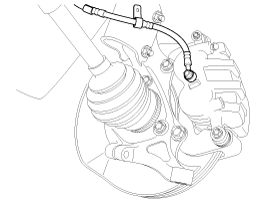
Connect the scan tool to the data link connector located underneath the dash panel.
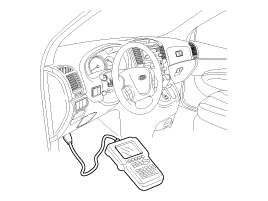
Select and operate according to the instructions on the scan tool screen.
You must obey the maximum operating time of the ABS motor with the scan tool to prevent the motor pump from burning.
Select Hyundai vehicle diagnosis.
Select vehicle name.
Select Anti-Lock Brake system.
Select air bleeding mode.
Press "YES" to operate motor pump and solenoid valve.
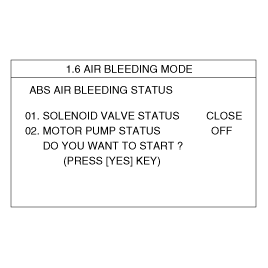
Wait 60 sec. before operating the air bleeding again. (If not, you may damage the motor.)
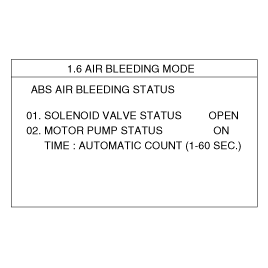
Pump the brake pedal several times, and then loosen the bleeder screw until fluid starts to run out without bubbles. Then close the bleeder screw.
Repeat step 5 until there are no more bubbles in the fluid for each wheel.
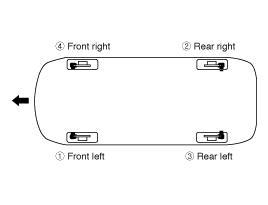
Tighten the bleeder screw.
Bleed screw tightening torque:
7~1 3 Nm (0.7 ~1.3 kgf·m, 5.1 ~ 9.4 lb-ft)
● : MIL ON ○ : MIL OFF
DTC CODE | Trouble description | Warning lamp condition | Etc. | ||
EBD | ABS | ESP | |||
C1101 | Battery voltage high | ● | ● | ● |
|
C1102 | Battery voltage low | ○/● | ● | ● |
|
C1200 | Wheel speed sensor front-LH open/short | ○/● | ● | ● |
|
C1201 | Wheel speed sensor front-LH range / performance / intermittent | ○/● | ● | ● |
|
C1202 | Wheel speed sensor front-LH invalid/no signal | ○/● | ● | ● |
|
C1203 | Wheel speed sensor front-RH open/short | ○/● | ● | ● |
|
C1204 | Wheel speed sensor front-RH range / performance / intermittent | ○/● | ● | ● |
|
C1205 | Wheel speed sensor front-RH invalid/no signal | ○/● | ● | ● |
|
C1206 | Wheel speed sensor rear-LH open/short | ○/● | ● | ● |
|
C1207 | Wheel speed sensor rear-LH range / performance / intermittent | ○/● | ● | ● |
|
C1208 | Wheel speed sensor rear-LH invalid/no signal | ○/● | ● | ● |
|
C1209 | Wheel speed sensor rear-RH open/short | ○/● | ● | ● |
|
C1210 | Wheel speed sensor rear-RH range / performance / intermittent | ○/● | ● | ● |
|
C1211 | Wheel speed sensor rear-RH invalid/no signal | ○/● | ● | ● |
|
C1213 | Wheel speed frequency error | ○/● | ● | ● |
|
C1235 | Primary pressure sensor – electrical | ○ | ● | ● | ESP only |
C1237 | Pressure sensor – other | ○ | ● | ● | ESP only |
C1260 | Steering angle sensor – signal | ○ | ○ | ● | ESP only |
C1261 | Steering angle sensor not calibrated | ○ | ○ | ● | ESP only |
C1282 | Yaw rate & lateral G sensor – electrical | ○ | ○ | ● | ESP only |
C1283 | Yaw rate & lateral G sensor – signal | ○ | ○ | ● | ESP only |
C1503 | ESP switch error | ○ | ○ | ● | ESP only |
C1513 | Brake switch error | ○ | ● | ● | ESP only |
C1604 | ECU hardware error | ● | ● | ● |
|
C1605 | CAN hardware error | ○ | ○ | ● | ESP only |
C1611 | CAN time-out EMS | ○ | ○ | ● | ESP only |
C1612 | ECU(brake system) hardware error | ○ | ○ | ● | ESP only |
C1616 | CAN bus off ESP | ○ | ○ | ● | ESP only |
C1623 | CAN time-out SAS | ○ | ○ | ● | ESP only |
C1625 | CAN time-out ESP | ○ | ○ | ● | ESP only |
C1626 | Implausible Control | ○ | ● | ● | ESP only |
C1702 | Variant Coding | ● | ● | ● | ESP only |
C2112 | Valve relay error | ○/● | ● | ● |
|
C2308 | Front-LH Valve error (Inlet valve) | ● | ● | ● |
|
C2312 | Front-LH Valve error (Outlet valve) | ● | ● | ● |
|
C2316 | Front-RH Valve error (Inlet valve) | ● | ● | ● |
|
C2320 | Front-RH Valve error (Outlet valve) | ● | ● | ● |
|
C2324 | Rear-LH Valve error (Inlet valve) | ● | ● | ● |
|
C2328 | Rear-LH Valve error (Outlet valve) | ● | ● | ● |
|
C2332 | Rear-RH Valve error (Inlet valve) | ● | ● | ● |
|
C2336 | Rear-RH Valve error (Outlet valve) | ● | ● | ● |
|
C2366 | USV1 error | ● | ● | ● | ESP only |
C2370 | USV2 error | ● | ● | ● | ESP only |
C2372 | HSV1 error | ● | ● | ● | ESP only |
C2374 | HSV2 error | ● | ● | ● | ESP only |
C2402 | Motor electrical | ● | ● | ● |
|